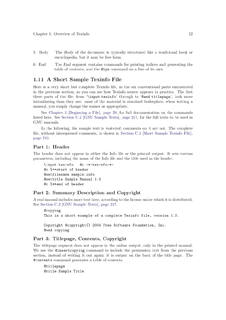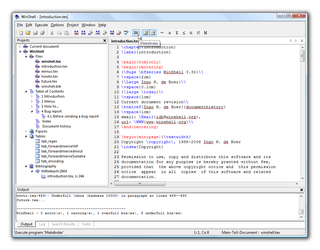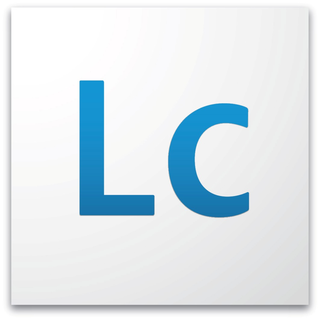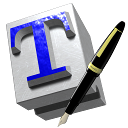The Portable Document Format (PDF) is a file format developed by Adobe in the 1990s to present documents, including text formatting and images, in a manner independent of application software, hardware, and operating systems. Based on the PostScript language, each PDF file encapsulates a complete description of a fixed-layout flat document, including the text, fonts, vector graphics, raster images and other information needed to display it. PDF was standardized as ISO 32000 in 2008, and no longer requires any royalties for its implementation.

Texinfo is a typesetting syntax used for generating documentation in both on-line and printed form with a single source file. It is implemented by a computer program released as free software of the same name, created and made available by the GNU Project from the Free Software Foundation.

WinShell is a freeware, closed-source multilingual integrated development environment (IDE) for LaTeX and TeX for Windows.
Yet Another Previewer is the name of two different document previewing applications, one for DVI and one for PostScript.

WinEdt is a shareware Unicode (UTF-8) editor and shell for Microsoft Windows. It is primarily used for the creation of TeX documents, but can also be used to edit HTML or any other type of text file. It can be configured to run as a front-end for a variety of TeX systems, including MiKTeX, fpTeX and TeX Live. WinEdt's highlighting schemes can be customized for different modes and its spell checking functionality supports multi-lingual setups, with dictionaries (word-lists) for many languages available for downloading from WinEdt's Community Site. It supports DVI and PDF workflow.

Adobe LiveCycle Enterprise Suite (ES4) is a service-oriented architecture Java EE server software product from Adobe Systems used to build applications that automate a broad range of business processes for enterprises and government agencies. LiveCycle ES4 is an enterprise document and form platform that allows capturing and processing information, delivering personalized communications, and protecting and tracking sensitive information. It is used for purposes such as account opening, services and benefits enrollment, correspondence management, request for proposal processes, and other manual based workflows. LiveCycle ES4 incorporates new features with a particular focus on mobile devices. LiveCycle applications also function in both online or offline environments. These capabilities are enabled through the use of Adobe Reader, HTML/PhoneGap and the Flash Player clients to reach desktop computers and mobile devices.
proTeXt is a freeware integrated development environment (IDE) for LaTeX running on Microsoft Windows, developed by Thomas Feuerstack. The most recent version is 3.1.9.
MacTeX is a free redistribution of TeX Live, a typesetting environment based on TeX. While TeX Live is designed to be cross-platform, MacTeX includes Mac-specific utilities and front-ends. It is also pre-configured to work out-of-the-box with macOS, as it provides sensible defaults for configuration options that, in TeX Live, are left up to the user to allow for its cross-platform compatibility.
PRC is a 3D file format that can be used to embed 3D data in a PDF file.
The computer program pdfTeX is an extension of Knuth's typesetting program TeX, and was originally written and developed into a publicly usable product by Hàn Thế Thành as a part of the work for his PhD thesis at the Faculty of Informatics, Masaryk University, Brno, Czech Republic. The idea of making this extension to TeX was conceived during the early 1990s, when Jiří Zlatuška and Phil Taylor discussed some developmental ideas with Donald Knuth at Stanford University. Knuth later met Hàn Thế Thành in Brno during his visit to the Faculty of Informatics to receive an honorary doctorate from Masaryk University.
Adobe Document Cloud is a free service from Adobe to store and share PDF files in the cloud and to access them on the go. The services also allows integration with Adobe tools to fill and sign forms electronically. The service offers 2GB of free storage. Its seamless integration with Mobile and Desktop apps creates an ecosystem where users can use their phone with apps such as Adobe Scan to take pictures of documents, convert them to PDFs, and upload and store them to the cloud. The files can be accessed from the webportal for Adobe Document Cloud as well as Adobe applications such as Adobe Acrobat DC and Adobe Acrobat Reader.
LEd is a TeX and LaTeX editing software working under Microsoft Windows. It is a freeware product.

TeXworks is free and open-source application software, available for Windows, Linux and macOS. It is a Qt-based graphical user interface to the TeX typesetting system and its LaTeX, ConTeXt, and XeTeX extensions. TeXworks is targeted at direct generation of PDF output. It has a built-in PDF viewer using the poppler library; the viewer has auto-refresh capability, and also features SyncTeX support.
Verbosus is a browser based LaTeX editor which allows a user to create and handle Latex projects in a browser. The graphical user interface (GUI) does deliberately not resemble non-browser-based Editors such as LEd or TeXworks. It was designed to function and being used in a browser.
See Adobe Acrobat for full details on this product.

TexLab is a TeX editor based on parallel programming. Contrary to other TeX editors which use a text file as input, TexLab was designed to process small binary document modules. TexLab typesetting engine is implemented by a thread pool to execute MiKTeX commands, such as: LaTeX, XeTeX or pdfTeX. MiKTeX is the version of LaTeX for Microsoft Windows; it consists of a set of tools to process text. Christian Schenk is the creator of MiKTeX, he studied Computer Science at TU Berlin. When Christian owned his first PC, he began working on a fun project; this project eventually became MiKTeX. TexLab interacts with Windows API's and Win32 through a thin level of abstraction provided by the C++ classes of Wintempla. TexLab interacts with MiKTeX commands through Anonymous pipes which is an interprocess communication (IPC) method.







